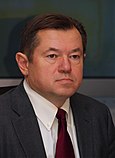Russian presidential election, 2004
|
|
|||||||||||||||||||||||||||||||||||||||||||||||||||||
|
|||||||||||||||||||||||||||||||||||||||||||||||||||||
|
|||||||||||||||||||||||||||||||||||||||||||||||||||||
|
|
|||||||||||||||||||||||||||||||||||||||||||||||||||||
|
Constituencies won by Vladimir Putin
Constituencies won by Nikolay Kharitonov
|
|||||||||||||||||||||||||||||||||||||||||||||||||||||
|
|||||||||||||||||||||||||||||||||||||||||||||||||||||
Vladimir Putin
Independent
Supported by
United Russia
Presidential elections were held in Russia on 14 March 2004. Incumbent President Vladimir Putin was seeking a second full four-year term. He was re-elected with 71.9% of the vote.
Glazyev was Minister for Foreign Trade under Boris Yeltsin, a Communist member of the State Duma and in 2003 became co-chairman of the newly established Rodina party. However, he failed to win the Rodina nomination because of a power struggle with Dmitri Rogozin, and ran as independent candidate. He campaigned as a critic of economic reforms. He argued that post-Communist governments have ignored social justice and promised to improve welfare.
Khakamada, the daughter of a Japanese Communist who took Soviet citizenship in the 1950s, emerged as Putin's most outspoken critic. A member of the State Duma for eight years, she lost her seat in 2003. She was a member of the Union of Rightist Forces, but did not run as a party candidate. "I am not afraid of the terrorists in power," she told the daily newspaper Kommersant. "Our children must grow up as free people. Dictatorship will not be accepted."
...
Wikipedia





